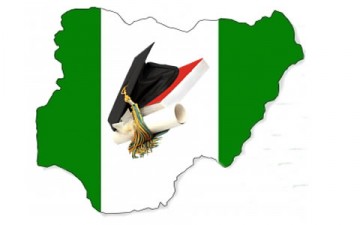”Teachers, as it were, are the backbones of any nation because they are responsible for shaping and nurturing the leaders of tomorrow, if indeed such nation is ready to remedy and rescue the future from the present. They, therefore, have to be sufficiently equipped to undertake the task of knowing how and what to teach the pupils, coupled with moral values. They must be responsible to the pupils as much as the state must be responsible to them, with descent working conditions, regular trainings and livable wages, so that they would not have any reason to be distracted from their core duties of impacting positively and cognitively on the younger generation.“
AS a youth and education development campaigner, I often get the chance to visit different parts of our country to interface with students, discuss and understand their challenges, gather data and offer same as a veritable tool of guidance for private sector institutions, government, regulatory agencies and other members of the society who may have the need for it. In January, I visited Edo State and engaged with stakeholders in government, young people on the streets, teachers, students and other ordinary citizens. In the coming weeks, I will be doing a series on Nigeria’s Education woes and conquests with the view of aggregating relevant information useful for Nigerians to see the need for our collective commitment and investment in Nigeria’s education system.
In the last five years, or thereabouts, Governor Adams Oshiomhole of Edo State has taken measured steps, even drastic actions, to raise the standard in the troubled education sector. Most recently, 836 Primary school teachers were relieved of their jobs on account of age falsification and incompetence related issues.
Some of them ought to have retired some 10 years ago at the maximum or five years ago at the minimum, but chose to corruptly retail themselves in the state’s service; thereby blocking their children’s and grandchildren’s employment into the state’s teaching service and stultifying the steady pace of educational advancement in the state. In the light of the foregoing, there is a lot to contend with in the nation’s education sector if education givers like teachers at the formative school stage are themselves embroiled in roughish conduct that spells doom for the future of education in Nigeria and for the younger generation.
The second is that of a female teacher early last year who demonstrated disastrous illiteracy that reminds one of kindergarten literacy. The incident forced the Oshiomhole Administration to embark on a total overhauling of the comatose education system that was left to decay. It is the second incident of a teacher who could not read a single sentence that gave away the other’s antics of age falsification.
The government in 2012 had sent 41 zonal inspectors and chief inspectors of education and local government education officers packing over non-performance and negligence of duty in a bid to sanitize the education sector. I believe the decision was the outcome of a thorough performance audit carried out by him. The crises coincided with the demotion of the Vice Principal of New Era College, Mr. S.E Akhabue, from Grade Level 15 to Grade Level 14 for being a perpetual latecomer. The time-book of the teachers, which the governor went through showed that the vice principal sometimes got to the office as late as 9:55a.m. The punitive measures taken didn’t go down well with political opponents who exploited the sentiments of some labour leaders who made spirited efforts to revert their punishment.
In addition to that, the teachers’ recruitment saga embarked upon by the state in 2011 was later discontinued due to massive money-for-employment scam by officials of the State Universal Basic Education, SUBEB, and even though some of the teachers had worked for upward of two months or so, the government paid them their fees and asked them to apply afresh; this time with thorough scrutiny. He didn’t stop at that. He swiftly dissolved the board and sacked all officials who were remotely involved in the racket. This has reined in, to some extent, the corruptive tendencies of SUBEB officials and others in the ministry of education.
The lapses in the education inspectorate came to the open when the governor paid a series of unscheduled visits to public schools across the state where he was gob smacked by discoveries bordering on absenteeism or by teachers.
Teachers, as it were, are the backbones of any nation because they are responsible for shaping and nurturing the leaders of tomorrow, if indeed such nation is ready to remedy and rescue the future from the present. They, therefore, have to be sufficiently equipped to undertake the task of knowing how and what to teach the pupils, coupled with moral values. They must be responsible to the pupils as much as the state must be responsible to them, with descent working conditions, regular trainings and livable wages, so that they would not have any reason to be distracted from their core duties of impacting positively and cognitively on the younger generation.
It would be foolhardy to expect any government to fold her arms after spending billions of taxpayers’ money renovating schools and pupils turn up only to be left on their own to count and admire the beautiful ceilings, ceiling fans, attractive walls and the alluring aesthetics while the inspectors that are saddled with the responsibility of making sure these schools are run effectively abandon their jobs. The question is should the government seek a truce with those who think they can subvert the system and then take refuge under the pavilion of mercy? What kind of education can a teacher who is incapable of reading or writing properly offer?
The people of this country at large may not have been sufficiently kept abreast of the realities of the parlous state of the nation’s educational system until the recent Oshiomhole-primary School Teacher’s-drama. The Edo incident offers the country classic evidence cum example of the collapse of the foundation of education in an astounding dramatic form. A female primary school teacher who had taught for about 20 years was unable to read her own age declaration affidavit even when the governor encouraged her by reading the text and asked her to repeat after him, she floundered. This pseudo Nollywood flick lasted for few minutes.
That depressing video as viewed by Nigerians on television and online has, though, become the butt of everyone’s joke on the internet yet is not Edo specific. It is a national crisis, which deserves decisive response.
The incident, which attracted wide commentary including some critical editorials, is most shameful, to say the least. It is a serious indictment on the teachers and the supervisory organs of our primary education system. As this was shown across the country and beyond, via print, electronic and social media, it sends the wrong signals to the World that we are less likely to meet the 2030 UNESCO target for equitable and qualitative education. It was a grand spectacle of the enormity of the suppurating rottenness, its cancerous effect and corrosive toxicity we are passing on to the future leaders of this country as education.
As demonstrated in Edo State, teachers’ credentials audit may have unfurled some of the worse cases, but what is most critical is how to redeem the system from harm. An embarrassing and destructive issue such as this calls for a tough policy decision. The good of the society, achieved through training of the mind – the essence of education – is in danger.
Therefore, government is encouraged to, not only sack the teachers found culpable in the certificate forgery and perjury scandal, but to also prosecute them. This, in my opinion, is the only reasonable action to take in order to save the future of the Nigeria child. As always the case, the policy makers of our States and National Houses of Assembly are less likely to spare a thought on the national embarrassing state of education in the country, from up to the bottom. For them, making laws that forcibly mandate 13-year old girl child into unconscionable marriage is the solution to Nigeria’s mirage of woes.
The general belief is that political will is needed to right majority of the wrongs in the state’s educational sector. It’s believed amongst Nigerians; even elsewhere that veil timidity, sympathy and tomfoolery are antithetical to good governance when the moral health of the society is being treated with kid gloves by political jobbers.
So many states across the country are yet to checkmate the profiteering syndicates that rule the employment of teachers by the officials and personnel of state Schools Management Boards. One of the ways to ensure that we do not get to this embarrassing state where teachers can’t read even their own document in the future is to subject teachers’ recruitment and employment process to external bodies and experts who may not have applicants’ affinity to the political party in power. There is no way we can separate the teachers employment racketeering and the attendant disgrace like the one we just witnessed in Edo State from politicians who are notorious for bending the rules for political patronage.
The primary school teacher’s scandal evokes the question of death of the Inspectorate Division in our education system. In the past, inspectors made unscheduled visits to schools to investigate teacher’s punctuality and performance in the classroom. We must as a matter of urgency return to the weekly or monthly monitoring of our public and private schools by tested and trusted inspectors who will not compromise the value and quality of the nation’s education, no matter the size of the financial inducement.
As I noted earlier, Edo State is not alone in the disheartening destruction of the nation’s educational system. In February, the Kaduna State Commissioner for Education, Usman Mohammed, at an education summit, stated that 1,300 out of the 1,599 state teachers failed arithmetic and basic literacy tests. The 1,300 teachers scored below 25 per cent. Similarly, in Kwara State, 259 teachers, among them university graduates, flunked a test meant for primary four pupils in 2008; while 16,000 teachers in Ekiti State (primary and secondary), shunned a competence test that Governor Kayode Fayemi had set for them in June 2012.
That there is a grand rot and purposeful pervasion by the minders of the nation’s education system across the country to ruin the most critical sector of the supposed national pride is to stress the issue to a breaking point. The collateral damage of equal indifference visited on the unsuspecting kids at the formative years is partly, if not wholly responsible, for the quality of graduates churned out every year, and their inability to write comprehensible application letter for employment.
Obviously, there is cause for alarm at a time Nigeria is in dire deficit of UNESCO’s education set target – Education for All (EFA) by 2030. The nation is still struggling with itself to keep the over 10 million children of school age off the streets; have them enrolled in schools, as a mechanism to checkmating destitution and security challenges that plague the country in recent past. In its 2006 Education Policy Series, UNESCO suggested that all new teachers should participate in quality induction and mentoring programmes; make working environment in schools learning friendly for both the educators and students; reinvent professional development for teachers and ensure better pay for teachers who demonstrated knowledge and skills that contribute to improved student achievement.
The Oshiomhole-female-teacher’s tragic episode in Edo calls for ethical rearmament: a total overhaul through national education policies that will reinvent the wheels of inductive education, qualitative mentorship and practical teaching of the kids. The modest achievement Governor Oshiomhole has made in the last five years would remain a flash in the pan if there is no institutional sustainability. These days I am fascinated with Mobile Learning and Education Technology and that will form the core of my next Article on this Page.





Leave a Reply